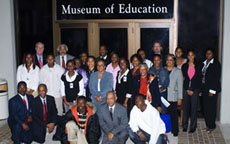

Principal W. A. Robinson |
|||||||||
|
William Albert Robinson came from American black aristocracy. His maternal grandfather, Thomas Day, was an early 19th century free black cabinetmaker from North Carolina whose pieces are highly prized today with a number of items owned by the North Carolina Museum of History (although Day’s successful business suffered during the mid-19th century and was under receivership shortly before the Civil War). Robinson’s father, David A. Robinson, was a physician in the Danville, Virginia area, this being where Robinson was born in 1890. David Robinson would die young, and his widow, Annie Day Robinson, would remarry James E. Shepard, the founder and president of what is now North Carolina Central University (the first public liberal arts institution for blacks in the United States). Robinson taught mathematics at this institution after receiving a B.A. degree in 1913 from Atlanta University. He continued as a secondary school math teacher in Louisville and Washington, DC until 1921 while also completing requirements for a B.S. degree at Teachers College. | ||||||||
In 1921, Robinson became supervisor of black secondary schools for the state of North Carolina while engaging in study for an M.A. degree at Teachers College. (His 1924 master’s thesis has yet to be found during recent archival searches.) During his seven-year tenure as a high school supervisor, the Garland Fund Studies stated in 1927 that the most astonishing development in North Carolina is that of the secondary school, and this success was specifically attributed to Robinson. In 1928, he would shift his interests to secondary school administration—becoming principal of the black high school in Knoxville and then, in 1931, accepting the principalship of Atlanta University Laboratory High School until assuming the full-time directorship of the Secondary School Study in the summer of 1940. For more information about William A. Robinson, see the chapter in the exhibition catalog, “William A. Robinson: A Prophet of Social Justice.” |
|||||||||



